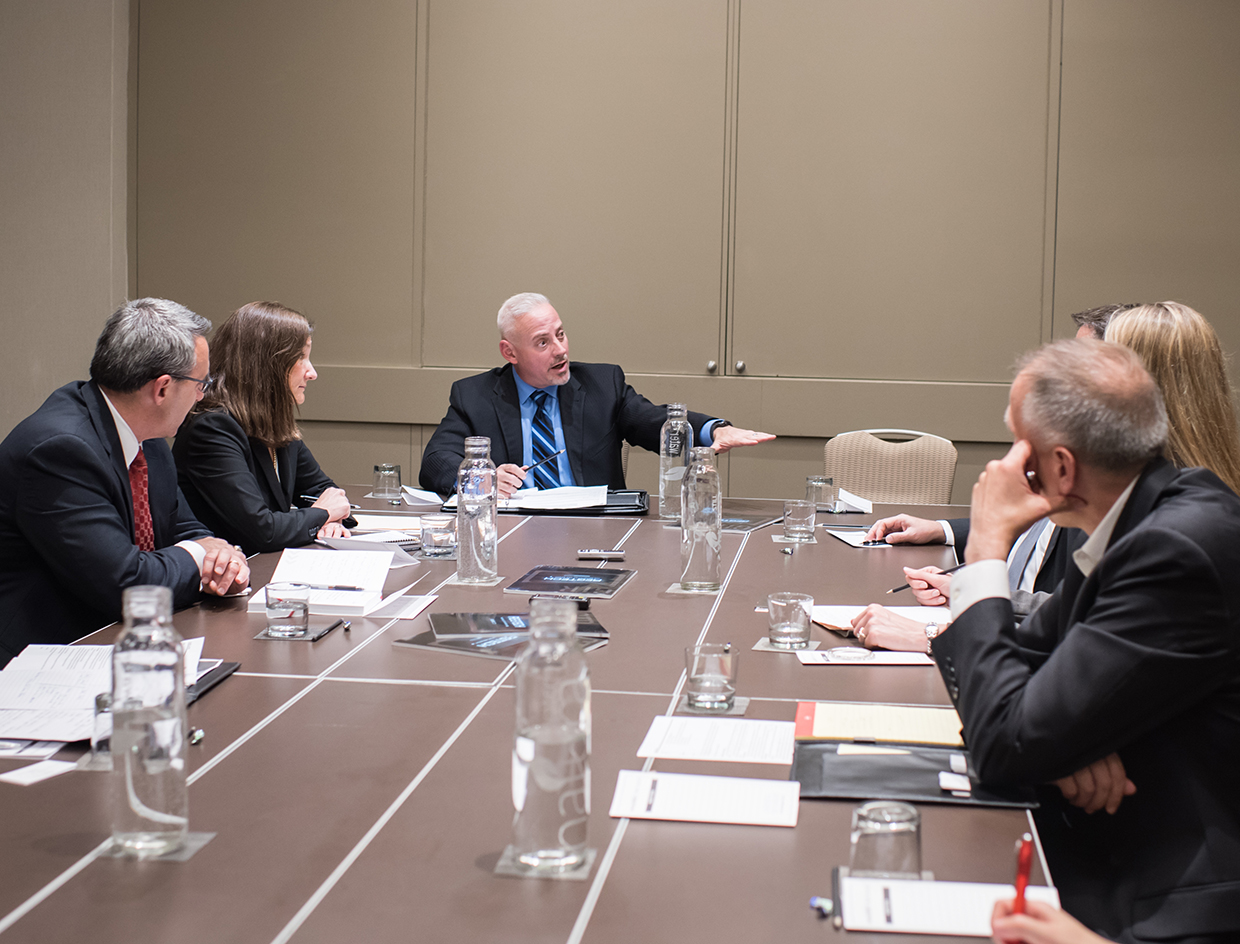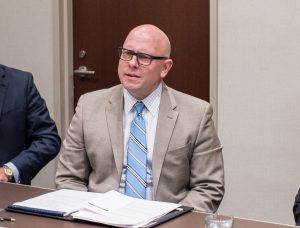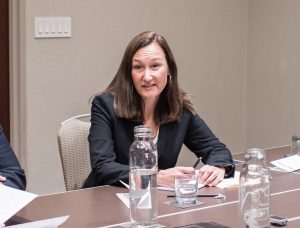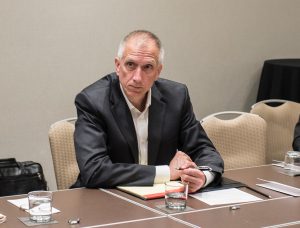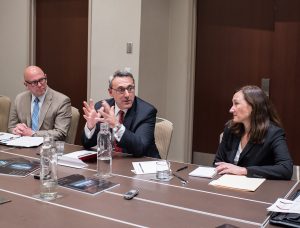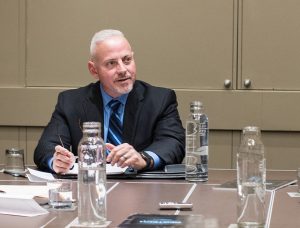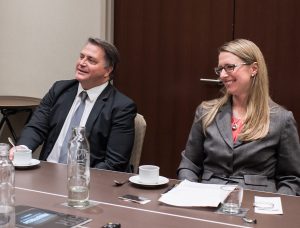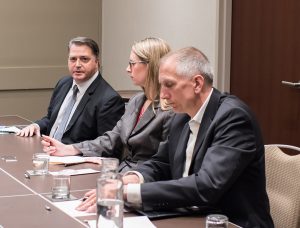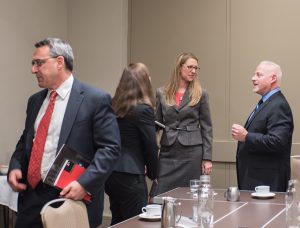GTR gathered trade credit and political risk experts ahead of the GTR US Trade & Working Capital Conference in Chicago to discuss the evolution of risk perception in the Americas.
Roundtable participants:
- Jeff Abramson, senior vice-president and head of trade receivables insurance, XL Catlin
- Stephen Atallah, head of risk and commercial underwriting, Coface North America
- Suzanne Garrod, head of the Americas, credit and political risk, Zurich
- Peter Hunter, vice-president, trade credit, Chubb
- Gayle Jacobs, partner, International Risk Consultants
- Jay LeClaire, Americas region manager, sales and marketing, Euler Hermes
- Scott Pales, senior vice-president, trade credit and political risk, Willis Tower Watson (chair)
Pales: With the growth of financial technology for banks and large corporates, how are insurers adapting to become part of this equation?
Atallah: There are a lot of key technologies that are in play right now. In fintech in general, you have data analytics, the internet of things, blockchain, but I think it is far down the chain in terms of practical application in the next three years. Also, you have the emergence of platforms: transactional platforms, e-invoicing platforms that are targeting mainly SMEs; and it is going to be up to the underwriters and insurers to match their business models and their technology with all of those technologies.
We are putting our money on data analytics. It is going to affect our decision-making and underwriting processes. A lot of automated credit decisions had an interesting beginning. Hopefully, this next generation will be more refined. The algorithms will be more sophisticated, and I think you will have a lot more third-party players and investment going into these fields. It is going to be a very competitive advantage for those who embrace this quicker.
Garrod: We are investing in an automated underwriting platform for trade credit. Speed to market will be critical in getting a competitive advantage in that particular area. Zurich has made huge investments into predictive analytics capabilities, and we hope to eventually leverage those capabilities in the trade credit and political risk area.
Pales: When we came through the financial crisis of 2008/09, many of the frequency-based blocks were tied back to automated underwriting. Now, granted, there had to be a human that sent those dockets, but it still was very interesting to see that the automatic underwriting platform did indeed generate a lot of that loss.
Abramson: I sort of agree. Internally, the benefit for the underwriter will be better data analytics. We like to think of ourselves as a pure excess-of-loss (XOL) carrier, so I don’t really see us making heavy investments in automated underwriting.
Do we really know what drives loss, or do we just think we know? Externally, based on my limited understanding of blockchain, I think there is some real benefit, almost like the next generation of supply chain platforms. The data can’t be corrupted and it is completely transparent, and that should hopefully provide benefit for us in making quicker and hopefully more accurate decisions. It also minimises the risk of dispute.
LeClaire: It’s a little too early to really have a real hold on how will we leverage those capabilities and that technology. We are completing pilots. Do we write our own blockchain platform, or do we partner with someone who may or may not do it better than us? How do we deliver those products and services efficiently, and allow our clients to gain a much greater benefit than today? And then, internally, some of the things we still do are, I won’t say slow, but they can be improved upon. So those are the things we are looking at very closely, regularly, with a focus on constant improvement.
Pales: Do you see this as going in the direction of, for example, a complete automation of policy issuance or automation in terms of claim settlements?
LeClaire: Absolutely. And if we are able to successfully achieve that process, how does that help the client experience? All of those variables come into play. E-docs, platforms, auctions, things like this, are all very critical. There is a lack of penetration in the Americas, and some of these things will help address that issue.
Hunter: We are going to continue to be a pure XOL player in the market. However, that is not going to stop us from partnering with clients and brokers who have a technology platform. In particular, I think that is a really good opportunity for us around this table to use this technology to take, as much as possible, the dispute element out of a claim transaction.
We are putting our money on data analytics. It is going to affect our decision-making and underwriting processes.
Stephen Atallah, Coface North America
Jacobs: We are big believers in technology, and to the extent that there are slightly different approaches being taken by the different insurers that we all work with, we have a portal that accommodates all of the above.
From the user perspective, we want to have an experience where you can have different policies that have different features or accessibility all in one place. With blockchain and some of these nascent technologies, in general, we are in favour, but we put more emphasis on human oversight and contribution.
Atallah: All these other technologies are emerging right now, and the banks are jumping all over them: anything that digitises something, speeds it up, or simplifies it. There is a lot of magic wanding going on: they thought everything would be solved with one of these technologies, but they are putting a lot on the line. That is where I’ll be keeping my eyes open for us to have a new source of business within the next 18 months.
Pales: Moving away from technology to the political landscape. How are clients reacting to the trade and regulatory policies that are currently coming from the US?
Jacobs: It hasn’t been this easy to have a conversation about political risk in a long time. Everyone is paying attention, and our clients have to be accountable to their senior management and their boards, and have an answer about what to say in these times. So, to the extent that it is priming the environment for these conversations, it is good for business, but it is a good thing when companies pay attention to geopolitical risk.
There is a lot of emotion, a lot of noise in general, but the question becomes, what trade policies are actually going to be unhinged? We have a number of clients that sell into Mexico quite heavily, and because of political turbulence and noise, the peso has gone kind of wild. For now, it is a great opportunity to teach our clients about what these products do, how they can help, and the risk mitigation that they bring.
Garrod: Customers are concerned that their buyers’ costs are going to increase, either because of tariffs or interest rates. We have seen some requests for embargo cover. Overall, the uncertainty in the US has definitely increased the flow of enquiries.
Abramson: I think it has further underscored that uncertainty. Almost to such a degree that nobody knows how to act yet or to make decisions. There is a degree of paralysis.
Last week, we were asked for cover on a healthcare entity that was exposed heavily to Medicare and Medicaid payment flows. That is an area where there is a lot of uncertainty about what will happen in respect to payment mechanics on these programmes, so that has really impacted our ability to underwrite risks like this. Domestically it is still a bit of wait and see.
Hunter: As far as the US and Nafta go, my mind really changes about every two weeks, depending on what is in the newspaper and what the latest tweet is, so it is really hard to say. For a couple of months, I was dead set against Mexico country risk, because I thought that, who knows, there could be a wall going up. It seems like we will potentially muddle through, and I am not foreseeing a disaster scenario. I think there is some good news in the world.
Who knows what is going to happen with Canadian lumber or US auto parts? I don’t know. But so far, I am not foreseeing a complete meltdown. The US cannot become an autarky; that is just not going to happen. We are just too tied into the global economy, thank goodness.
As time passes, it seems that perceived risk for companies in Mexico is more stable.
Stephen Atallah, Coface North America
Atallah: You have to be in the countries, in the risk profiles, knowing which sectors might be vulnerable in Mexico or not, and then we form a dialogue. We were concerned about Mexico when the new US administration took office, but as time passes, it seems that perceived risk for companies in Mexico is more stable, so we are remaining cautious, and open for business there.
This environment is too weird to focus on the administration right now. There is just not enough meaningful, consistent, rational activity, so you can’t predict it for the next three years. You have to pretty much write it off and assume that as every month goes by, there would be less ability to implement anything with a long-lasting impact on the global economy.
Pales: In Western Europe, trade credit insurance penetration is far, far deeper than it is here in the US. How do we use this current environment and the uncertainty it creates to seek greater degrees of penetration?
Abramson: I feel like we have all been having this conversation for 15, 20 years. And the opportunity is always just over the horizon, and we only need to educate the market better to increase the penetration. I do think that is part of the answer, but it goes beyond education. We need to be aggressive.
Those of us who are the multiline carriers have a unique opportunity in the context of cross-selling with other product lines, and although that is something that is easier said than done, we need to try to take advantage of this in terms of prospects, introducing them to the product as well as trying to come up with some more unified coverage types, whether it is crime, cyber, trade credit or other kinds of combinations.
We need to underscore that this is not a commoditised product. It is very much uncommoditised. We are doing everything from supply chain, to single risk, multi-buyer, XOL: this is not an off-the-shelf type product anymore, and I think the more that we collectively emphasise the mantra, ‘hey, you have a problem, let’s try to develop a solution’, rather than, ‘this is what trade credit is, take it or leave it’, the better. Maybe that moves the needle. I also don’t think trying to match the penetration rates of Europe is necessarily the right objective, but clearly there is more that we can do here.
LeClaire: Americans are more willing to take risk than our European clients. The banking environment is very different. All of those variables in Europe create an environment where the market generally perceives credit insurance as enabling good business between all parties, and I don’t think we’ve achieved that level of comfort here. All of this is what we, collectively, battle with on a day-to-day basis.
Atallah: Do we know what the penetration rate is in the US, and if it is growing or declining?
Pales: Generally, what we hear is that it is somewhere between 4% and 7%. From a Western European perspective, we hear anything from 40% to 48%.
I don’t think trying to match the penetration rates of Europe is necessarily the right objective, but clearly there is more that we can do here.
Jeff Abramson, XL Catlin
Hunter: The European credit teams that I have spoken with have a much different attitude, or expertise level, than what you would have in the US. I hate to say that Americans are better than Europeans at something, but I think in credit they might actually be, at least from what I have seen. Mainly because Europeans say: ‘I don’t need a credit department. I push the button and my carrier says yes or no and they give me a decision, sometimes instantaneously.’
Jacobs: As far as market penetration remaining low, I think one of the biggest challenges for all of us at this table is a good economy. It can be a constant battle to justify the case for credit insurance, depending on the attitude of the customer. It might be an American tendency, but when companies cut costs, this can be the optional one that goes first. Meeting sales goals while having claims approved reinforce the value proposition.
Pales: What other political risks are your clients approaching you with, and what are the key concerns surrounding those risks?
Garrod: Generally, we are seeing a lot of demand for coverage in markets where we have always seen coverage. And where, depending upon our limits, we may or may not have lots of capacity to offer. I think that Argentina is a good example where we would like to do more, to the extent that we have capacity available. Turkey is a market where there is certainly a higher degree of risk, and we continue to underwrite very selectively in that market. The same with Brazil.
Pales: How do you adapt when things change so quickly?
Garrod: There are cases where it is really important to stand behind our customers. If the risk deteriorates to such an extent that it doesn’t make sense, I think that is a call that needs to be made, but it really depends case by case.
Abramson: I don’t know if there is anything new under the sun. Russia, Brazil, China, Turkey, Sub-Saharan Africa; there is a lot of headline-chasing in terms of what our clients are concerned about, and that is understandable.
In terms of adapting, the reality is we have kind of limited tools. In some cases you can meet certain thresholds by not covering a particular risk; but we try to reintroduce that oh-so-archaic concept of pricing to risk, and actually look to get compensated for the risks that we are at least perceiving.
More broadly, one thing we are really focused on, in terms of political risk and maybe trying to get closer to those risks, is through more public-private partnerships, partnering with ECAs and multilaterals, which we have seen in the project finance area, as well as in the short-term arena.
LeClaire: Turkey, Russia, Ukraine, Brazil, Venezuela, Argentina; those are the country risks. Depending on what side of the organisation we are all on, we push the envelope, we appeal for certain decisions, and we argue on behalf of our client and our partner. There are good businesses in these countries. And being flexible, and being able to address a specific issue, as opposed to saying, ‘oh, it is in Brazil, forget it’, is important. I think all of the carriers have responded to that issue. As brokers, would you agree with that?
Pales: Absolutely. For example, I’ve got a political risk programme with a Venezuelan line, and it has been renewed each and every period, every three years, despite the fact that now we are seeing that no-one would issue new lines like this one. We do see the ability to adapt, be flexible, and issue terms. But there are other regions where it really doesn’t matter, like for example, new risk in Venezuela.
LeClaire: I think part of that goes back to technology and predictive analytics, and all of that data that you can mine. However, it is nice to have people in these regions, because if you live in that region or in that country, you might have a different perspective than me sitting in New York.
Atallah: We don’t see any discernible patterns coming out of new political risk enquiries. We know all about the ‘hot pockets’, although we are seeing a lot more activity and we are going into Argentina happily, to the point that every market has something for businesses.
There is a way to stick with the good clients in the difficult sectors through a cycle. That said, there will be some clients that perhaps we shouldn’t stick with.
Peter Hunter, Chubb
It is also important that we know that clients don’t just wander into these markets. These are usually long-term investment planning, or they have been there, or are planning to invest large money there, so they are pretty adept as well. That is what we are seeing more of, and we want to be a part of that flow, and political risk opportunities don’t tend to just be one-offs.
Over the years, political risk has really evolved. Carriers and others have some really cool new political risk tools that I don’t think were that obvious or around back then. Pre-shipment risks, all sorts that are modified to the modern world, risk of conflict that is not by war, whether it is labour or not, it is really much more tailored now. I think that users should be happy in that sense, and we will see where their investment planning takes them.
Pales: From a sectoral basis, what sectors do you want to be in? And does a sector that is working really well necessarily equate to the asset?
Atallah: Coface has a good level of confidence in the pharmaceutical sector generally. In any sector, there will be strong companies and riskier ones. This is very true in the retail sector, where we try to use our expertise to sort out the better risks, and avoid being overly reactionary so we can continue to support our clients in that sector.
Hunter: There are going to be good clients in bad sectors. As a carrier, I don’t think I have the luxury to say, ‘I am going to insure you this year’, but, the following year, the sector has deteriorated and I want out. Somehow, with additional risk sharing, or whatever variables we can bring to play, or risk-based pricing, there is a way to stick with the good clients in the difficult sectors through a cycle. That said, there will be some clients that perhaps we shouldn’t stick with, and so I think it is more a question of client selection as opposed to sector selection.
Pales: Are there sectors right now that you realistically, despite a good client, would tend to shy away from?
Hunter: Six months ago, I might have said oil and gas. Today, I wouldn’t say that. A year ago, 18 months ago, I might have said steel. Today, I would not. Today, it is easy to say that we are not keen on retail. Who would be, with Amazon out there eating everybody’s lunch? But again, retail is such a huge user of trade credit insurance that it is very difficult for us to say we are going to back off. Of course, we are going to be selective, and that is our job as underwriters. But we certainly won’t exit. I think we might let off the gas a little bit.
LeClaire: We have a massive retail portfolio. We are not pulling the plug. We can’t pull the plug. We won’t pull the plug. Selective is the strategy. There are good businesses in bad sectors. We see opportunities in electronics, food, chemicals, lumber, plastics, steel. What we are not keen on is precious metals and diamonds.
We look at other channels, and we continue to look to our broker partners and our finance partners on the banking side to develop greater capacity and greater solutions.
Jacobs: Can I add, as a Michigan-based person, the automotive industry as one with growing interest and utilisation? Unlike the cyclical nature of retail, I feel like it is a steady increase. Because there are wildcats out there like Elon Musk who keep the automotive industry, among others, as a topic of interest too.
Abramson: We try to be sector-agnostic. I will say it is hard not to be wary of bricks-and-mortar retail. Otherwise, we like pharma, chemicals, logistics and food; I think those have been traditionally good sectors for trade credit. We try to stay open. Some of our appetites are driven by expertise. We have an office and a political risk and trade credit underwriter in Brazil. Brazil is a challenging market, so we are getting more on-the-ground information from who we have down there, and hopefully being at least a little more thoughtful about what we will or won’t do.
Similarly, we have analysts and underwriters with particular expertise that have some more depth and understanding of a particular sector than others, and on that basis, we are able to get more comfortable in accepting risks.
Garrod: We have not segmented our underwriting based on sectors. Rather, we have focused on the ability to underwrite good risks in a variety of sectors. Also, we have found that it may be advantageous to take on acceptable risks in a more challenging sector or two, to get business that makes sense from a pricing perspective.
Pales: Let’s talk about cyclical industries: when things are working really well for a client, they view trade credit insurance as discretionary spend. On the other hand, when times get rough for a sector, you get the insurers pulling back on that capacity when the insured is looking for it. How do we best manage that position?
Jacobs: I think the fundamental word there is relationship, to the extent that we are building relationships that take a long view and try to use insurance strategically. If an insurer says: ‘We don’t know if we can stay with you on this one,’ there needs to be a very vigorous discussion about why, to avoid leaving an insured high and dry at a critical moment. If the client has a reason to stay there, the insurers have a reason to stay with them in those countries.
We have found that it may be advantageous to take on acceptable risks in a more challenging sector or two, to get business that makes sense from a pricing perspective.
Suzanne Garrod, Zurich
Pales: Finally, what do we feel are the key drivers for client satisfaction?
Garrod: Speed to market.
Abramson: With respect to trade credit, coverage is king. It’s those tough names: ‘Can you? Can’t you?’ That is what the main driver is.
LeClaire: Responsiveness, high-quality information, high-quality service.
Hunter: I guess whatever makes the credit manager look good.
Jacobs: Getting full limits, through syndications if necessary, and getting your claim paid. Two fundamentals for a broker.
Atallah: Three absolute musts: timeliness, competitiveness and collaboration.
